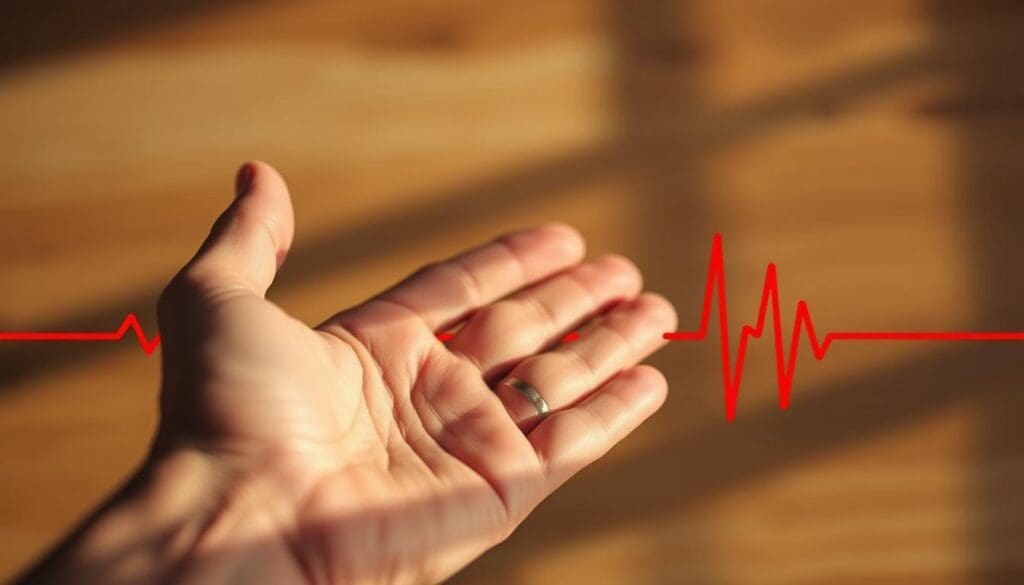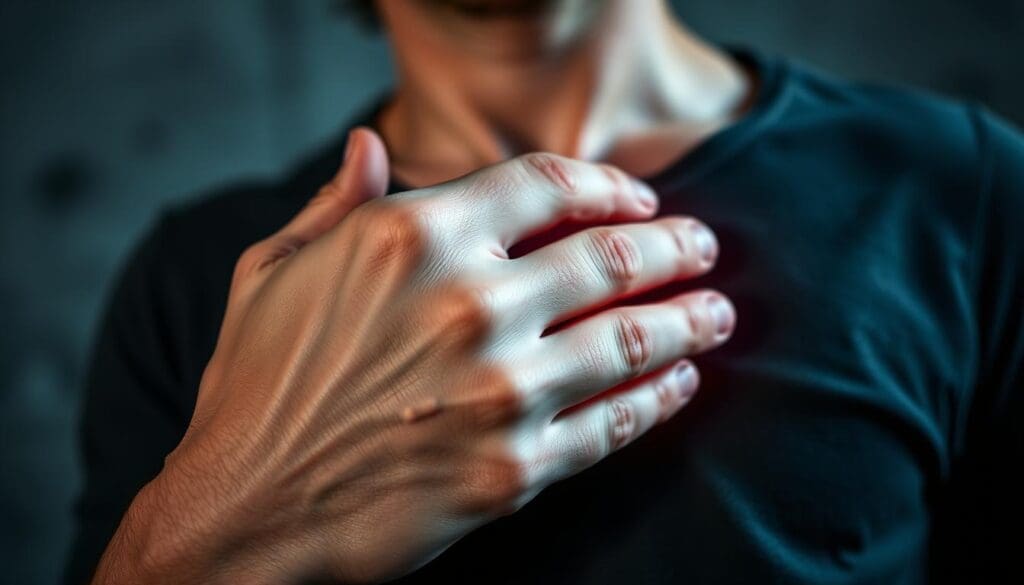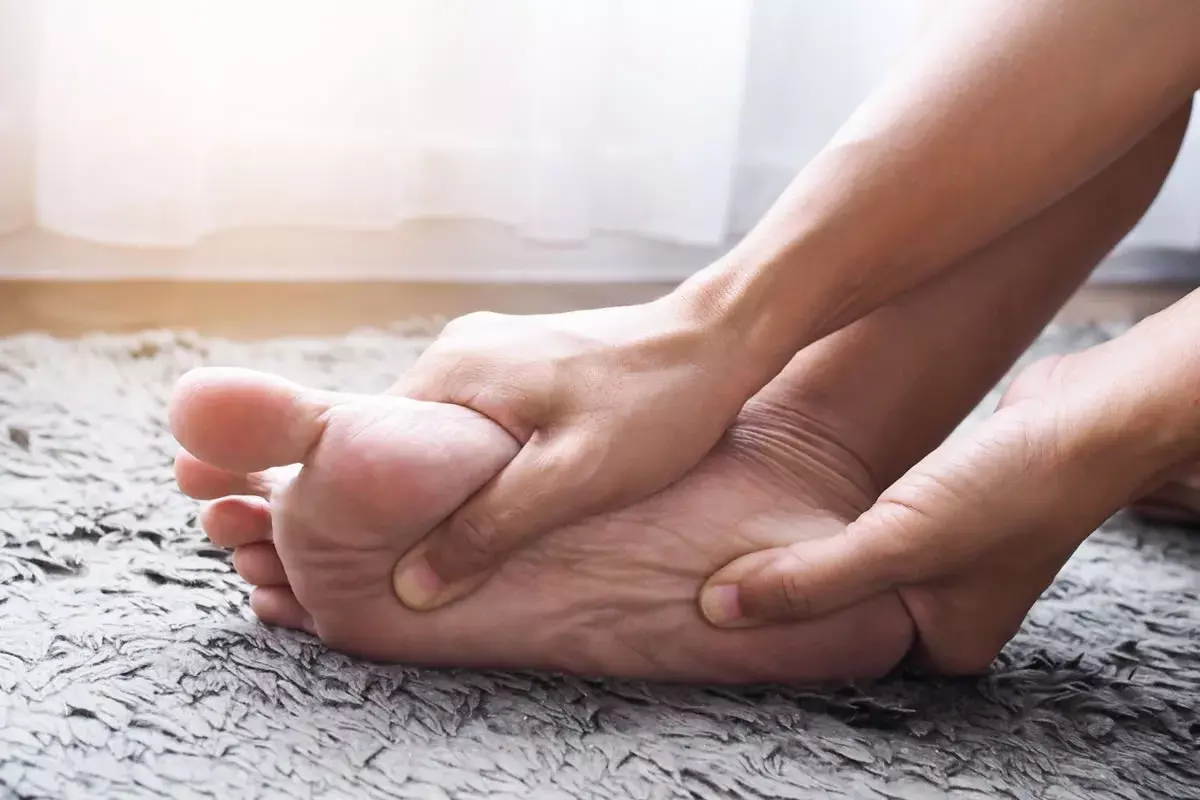
When we face anxiety, our body’s stress response kicks in. This leads to a fast heart rate and can cause discomfort. At Liv Hospital, we know how anxiety affects our well-being. We’re here to offer innovative and caring solutions.
Feeling a high heart rate due to stress is normal. UFC fighter Nathaniel Wood has talked about his anxiety and OCD struggles. His story shows how mental health can impact our physical health. We aim to help patients manage anxiety and find peace.
Key Takeaways
- Understanding the physiological response to anxiety and stress
- Recognizing the impact of mental health on physical well-being
- Liv Hospital’s commitment to innovative and compassionate care
- Practical ways to calm a fast beating heart caused by anxiety
- Restoring calmness and comfort through effective management
Understanding Why Your Heart Beats Fast During Anxiety

When anxiety strikes, your body’s stress response kicks in. This leads to a faster heart rate, which can feel strange and scary. This reaction is a natural way for your body to get ready to face danger or run away from it.
The Physiological Stress Response
The stress response is controlled by the sympathetic nervous system. It’s the system that makes you feel ready to fight or flee. When you see a threat, this system goes into action, releasing hormones like adrenaline and noradrenaline.
These hormones start a chain of effects, like a faster heart rate and higher blood pressure. Your body is getting ready to deal with the danger. But, if you’re always anxious, your heart might stay fast for too long.
How Adrenaline and Noradrenaline Affect Your Heart
Adrenaline and noradrenaline directly affect your heart. They make it beat faster and stronger. This happens because these hormones work on the heart’s beta-1 receptors, making it work harder.
“The release of adrenaline and noradrenaline is a key part of the stress response. But it can also cause uncomfortable symptoms like a racing heart.”
Along with a faster heart rate, your blood pressure can change. This is because of other changes in your blood vessels. Knowing about these changes can help you manage your anxiety-related heart symptoms better.
| Physiological Change | Effect on the Heart |
|---|---|
| Release of Adrenaline and Noradrenaline | Increased Heart Rate and Contractility |
| Stimulation of Beta-1 Receptors | Enhanced Heart Rate and Contraction Force |
| Vasodilation and Vasoconstriction | Variations in Blood Pressure |
Common Symptoms of Anxiety-Related Heart Racing
Heart racing due to anxiety can show up in different ways. You might feel your heart pounding, skipping beats, or beating irregularly. Some people feel their heart fluttering in their chest.
- Palpitations or a pounding heart
- Irregular heartbeat or arrhythmias
- Sensation of the heart skipping beats
- Fluttering or throbbing in the chest
Knowing these symptoms are linked to anxiety can help you tackle it better. By understanding what’s happening in your body, you can start managing your anxiety and calm your heart.
Heart Beating Fast Anxiety: The Science Behind Your Symptoms

Anxiety makes our hearts beat fast and can be scary. This happens because of how our body reacts to stress. It involves many systems and chemicals in our body.
What Happens in Your Body During an Anxiety Episode
When we feel anxious, our body goes into “fight or flight” mode. This releases stress hormones like adrenaline. These hormones make our heart beat faster and our blood pressure go up. This gets our body ready to face or run from danger.
The changes in our body include:
- Our heart beats faster and pumps more blood
- We breathe quickly and might breathe too much
- Our muscles, like those in our chest and neck, get tight
- We get more glucose in our blood for energy
This response is meant to be short-lived. But for people with anxiety disorders, it can last a long time and cause a lot of distress.
The Difference Between Anxiety Palpitations and Heart Problems
Heart palpitations from anxiety can be scary and make us worry about our heart. But it’s important to know if these palpitations are from anxiety or a heart problem.
Here’s how to tell the difference:
- Nature of Palpitations: Anxiety makes our heart beat irregularly or feel forceful. Heart problems might make our heart beat in a more consistent or rhythmic way.
- Context: If palpitations happen during or right after feeling anxious, they’re likely from anxiety.
- Associated Symptoms: Anxiety palpitations often come with other symptoms like shaking, sweating, or feeling scared.
Even though anxiety can be uncomfortable, it’s key to see a doctor. This is to make sure there’s no heart problem, which is important if you have risk factors or a family history of heart disease.
How Chronic Anxiety Impacts Cardiovascular Health
Long-term anxiety can really hurt our heart health. Research shows that ongoing anxiety can:
- Make us more likely to get high blood pressure
- Make heart problems worse
- Maybe even cause irregular heartbeats
A study found that anxiety can increase the risk of heart problems in people with heart disease. This shows why managing anxiety is key for heart health.
Understanding how anxiety affects our heart can help us manage it better. It also helps us know when to see a doctor for our heart health.
Deep Breathing Techniques to Slow Your Racing Heart
Deep breathing is a great way to calm your heart and reduce anxiety. When we feel anxious, our body goes into “fight or flight” mode. This makes our heart beat faster. Deep breathing helps calm this response and brings relaxation.
Box Breathing Method for Immediate Relief
The box breathing method, or square breathing, is simple yet effective. It helps reduce stress and anxiety. Here’s how to do it:
- Exhale slowly through your mouth for a count of 4.
- Hold your breath for a count of 4.
- Inhale slowly through your nose for a count of 4.
- Hold your breath again for a count of 4.
This creates a “box” shape with your breath. Focusing on the count helps distract you from anxious thoughts and calms your nervous system.
Diaphragmatic Breathing to Activate the Parasympathetic System
Diaphragmatic breathing, or belly breathing, uses the diaphragm muscle. It’s more efficient than shallow chest breathing. It helps relax and reduce anxiety by activating the parasympathetic nervous system.
To practice, place one hand on your belly and the other on your chest. Inhale slowly through your nose, letting your belly rise. Your chest should not move. Exhale slowly through your mouth, letting your belly fall.
The 4-7-8 Technique for Bedtime Anxiety
The 4-7-8 breathing technique, or “Relaxation Breath,” is great for bedtime anxiety. Here’s how to do it:
- Inhale through your nose for a count of 4.
- Hold your breath for a count of 7.
- Exhale through your mouth for a count of 8.
This technique slows your heart rate and promotes relaxation. It makes falling asleep easier. Adding these deep breathing techniques to your daily routine can help manage anxiety and improve your well-being.
Progressive Muscle Relaxation to Reduce Heart Rate
Progressive muscle relaxation is a great way to handle anxiety-related heart rate spikes. It involves tensing and relaxing muscles to lower tension and relax the body.
Full-Body Tension and Release Protocol
Start by getting comfy, either sitting or lying down. Begin with your toes, tense them for a few seconds, then release. Move up your body, tensing and relaxing each group: feet, calves, thighs, hips, back, shoulders, arms, hands, neck, and face.
This method reduces physical tension. It can slow down a racing heart due to anxiety.
Quick 5-Minute Version for Acute Anxiety
For sudden anxiety, try a quicker version. Focus on big muscle groups: legs, abdomen, chest, shoulders, and arms. Tense each for 5-7 seconds, then relax for 10-15 seconds. Repeat for 5 minutes to calm your body and slow your heart rate.
Combining Muscle Relaxation with Breath Work
Adding deep breathing to muscle relaxation boosts its effect. Tense muscles while inhaling deeply. Release tension while exhaling slowly. This helps calm your heart rate by activating your parasympathetic nervous system.
| Technique | Description | Benefit |
|---|---|---|
| Full-Body Tension and Release | Tense and relax muscle groups from toes to head | Reduces overall muscle tension |
| Quick 5-Minute Version | Focus on major muscle groups for rapid relaxation | Quickly calms the body during acute anxiety |
| Combining with Breath Work | Synchronize tensing/relaxing with deep breathing | Enhances relaxation and reduces heart rate |
Adding progressive muscle relaxation to your anxiety tools can help slow a fast heart rate. It’s a powerful technique for managing anxiety.
Mindfulness and Meditation Practices for a Calmer Heart
Mindfulness and meditation calm the heart by working on body and mind. Adding these to your daily routine helps manage anxiety and heart palpitations.
Body Scan Meditation for Physical Awareness
Body scan meditation is done lying down or sitting. It focuses on each body part, starting from toes to head. This helps release physical tension.
To start, find a quiet spot, close your eyes, and breathe deeply. Focus on each part of your body, letting go of tension as you exhale.
Heart-Focused Meditation Techniques
Heart-focused meditation targets the heart area. It brings calmness and reduces stress and anxiety.
Sit comfortably with your eyes closed. Imagine calmness entering your heart as you inhale. Exhale, letting go of tension or anxiety.
Guided Imagery to Reduce Chest Tightness
Guided imagery uses peaceful scenes to calm the mind and body. It’s great for easing chest tightness from anxiety.
Get comfortable, close your eyes, and picture a peaceful place like a beach or forest. Use all your senses to immerse yourself in the scene.
Mindfulness and meditation help a lot with anxiety and heart palpitations. Here’s a quick look at their benefits:
| Technique | Primary Benefit | Secondary Benefit |
|---|---|---|
| Body Scan Meditation | Reduces physical tension | Enhances body awareness |
| Heart-Focused Meditation | Promotes emotional calmness | Fosters compassion |
| Guided Imagery | Reduces anxiety | Enhances relaxation |
Adding mindfulness and meditation to your day can really help with anxiety and heart issues. For more ways to manage stress, check out Ayurvedic stress management.
Physical Techniques to Quickly Regulate Your Heart Rate
We can calm a fast-beating heart with specific physical techniques. These methods are simple, effective, and easy to add to our daily lives.
Cold Water Facial Immersion to Trigger the Dive Reflex
Cold water facial immersion triggers the dive reflex, slowing down the heart rate. Fill a bowl with cold water and ice. Then, submerge your face for 30 seconds to 1 minute while holding your breath.
Benefits: It stimulates the parasympathetic nervous system, reducing heart rate and promoting relaxation.
Precautions: Avoid if you have certain medical conditions like heart problems or high blood pressure without consulting a healthcare provider.
Vagal Maneuvers That Cardiologists Recommend
Vagal maneuvers stimulate the vagus nerve, helping to regulate heart rate. The Valsalva maneuver is a common technique. It involves holding your breath and bearing down as if having a bowel movement.
- Valsalva Maneuver: Hold your nose, close your mouth, and try to blow air through your nose for 10-15 seconds.
- Coughing: Coughing can also stimulate the vagus nerve and help slow down a racing heart.
- Bear Down Maneuver: Similar to the Valsalva, but involves bearing down as if having a bowel movement.
Gentle Movement Practices to Calm Palpitations
Gentle movement practices like yoga and tai chi can calm palpitations. They promote relaxation and reduce stress. These exercises combine physical movement with deep breathing techniques.
Some beneficial poses include:
- Child’s Pose
- Cat-Cow Stretch
- Legs Up The Wall Pose
These poses help calm the nervous system and reduce anxiety-related heart symptoms.
Cognitive Strategies to Break the Anxiety-Heart Rate Cycle
By using certain cognitive strategies, people can handle anxiety-related heart palpitations better. These techniques are key in stopping the cycle of anxiety and a fast heart rate.
Identifying and Challenging Catastrophic Thoughts
One main strategy is to spot and fight off catastrophic thoughts linked to anxiety. These thoughts can make heart palpitations worse, starting a bad cycle.
To fight these thoughts, we can follow a simple yet effective process:
- Identify the thought causing distress.
- Assess the likelihood of the catastrophic outcome.
- Consider alternative, more realistic explanations.
Worry Postponement for Persistent Heart Concerns
Worry postponement is another good strategy. By setting a specific “worry time” later in the day, people can better handle ongoing heart worries.
| Step | Description |
|---|---|
| 1 | Recognize when you’re worrying about heart concerns. |
| 2 | Postpone the worry to the designated “worry time.” |
| 3 | Focus on the present moment and engage in a different activity. |
Positive Self-Talk Scripts for Heart Palpitations
Positive self-talk scripts are very helpful during heart palpitations. By using reassuring words, people can calm their heart rate and lower anxiety.
Examples of positive self-talk scripts include:
- “My heart is strong and capable.”
- “I can manage my anxiety.”
- “This too shall pass.”
By adding these cognitive strategies to daily life, people can stop the anxiety-heart rate cycle. This helps them achieve a calmer heart.
When to Seek Medical Help for Anxiety-Related Heart Symptoms
When you feel your heart racing due to anxiety, knowing when to see a doctor is key. Many symptoms, like a fast heart rate, are not serious but can sometimes be a sign of something more. It’s important to know when to get medical help to stay safe and healthy.
Distinguishing Between Anxiety and Serious Heart Conditions
Telling if your heart symptoms are from anxiety or a heart problem can be hard. Signs like palpitations, chest pain, or trouble breathing can mean either. Always see a doctor if you’re not sure what’s causing your symptoms. They can run tests, like an ECG, to figure out if it’s anxiety or something serious.
The American Heart Association says anxiety can make your heart beat fast, just like heart problems.
“It’s not always easy to tell the difference between anxiety-related heart symptoms and those caused by a heart condition,” says a cardiologist. “That’s why it’s essential to consult with a healthcare professional.”
Red Flags That Warrant Immediate Medical Attention
Some symptoms need immediate help, no matter if you think they’re from anxiety. These include:
- Severe chest pain or pressure
- Difficulty breathing or shortness of breath
- Severe dizziness or fainting
- Rapid or irregular heartbeat that persists or worsens
- Severe anxiety or panic that interferes with daily life
If you have any of these symptoms, get medical help right away. It’s always safer to be cautious with your heart health.
Working With Healthcare Providers on Anxiety Management
Managing anxiety well often means working with your healthcare team. They can help you create a plan that deals with your anxiety and heart symptoms. This plan might include therapy, medication, and lifestyle changes.
The Anxiety and Depression Association of America says cognitive-behavioral therapy (CBT) is a top treatment for anxiety. Talk to your doctor about these options to find what works best for you.
By knowing when to seek medical help for anxiety symptoms and working with your healthcare team, you can manage your anxiety better. Learning how to calm your heart during anxious moments is a big part of this journey.
Conclusion: Taking Control of Your Anxious Heart
We’ve looked at many ways to handle heart beating fast anxiety. This includes deep breathing and thinking strategies. Knowing how stress and adrenaline work on your heart helps you deal with anxiety better.
At Liv Hospital, we stress the need to manage your anxious heart symptoms. Using techniques like muscle relaxation and mindfulness can help. These methods can make anxiety palpitations less common and less severe.
Controlling your anxious heart is a journey. It takes time, self-awareness, and the right support. With the help of healthcare providers and the strategies we’ve discussed, you can manage your anxiety. This will also improve your heart health.
Can anxiety cause a high heart rate?
Yes, anxiety can make your heart rate go up. This is because stress hormones like adrenaline and noradrenaline are released. They get your body ready for the “fight or flight” response.
How can I calm my heart rate when I’m feeling anxious?
You can try deep breathing, progressive muscle relaxation, or mindfulness meditation. These methods can help calm a racing heart caused by anxiety.
What is the difference between anxiety palpitations and heart problems?
Anxiety palpitations are irregular heartbeats from anxiety. Heart problems are serious conditions of the heart. While anxiety palpitations are usually safe, it’s important to see a doctor to check for heart issues.
How does chronic anxiety impact cardiovascular health?
Chronic anxiety can raise blood pressure and strain the heart. It can also make heart conditions worse. It’s key to manage anxiety to keep your heart healthy.
What is the 4-7-8 breathing technique, and how can it help with anxiety?
The 4-7-8 technique involves breathing in for 4 counts, holding for 7, and exhaling for 8. It can slow your heart rate and help you relax.
Can physical techniques like cold water facial immersion help regulate heart rate?
Yes, cold water facial immersion can slow your heart rate. Other physical methods, like vagal maneuvers and gentle exercises, can also be helpful.
How can cognitive strategies help break the anxiety-heart rate cycle?
Cognitive strategies like challenging negative thoughts and using positive self-talk can manage anxiety. This can help lower your heart rate.
When should I seek medical help for anxiety-related heart symptoms?
If you have chest pain, dizziness, or shortness of breath, get help right away. Also, see a doctor if you’re worried about your heart symptoms related to anxiety.
How can healthcare providers help with anxiety management?
Doctors can diagnose conditions, offer advice on managing anxiety, and suggest treatments. At Liv Hospital, we work with international patients to provide full care.
What is the resting heart rate and anxiety connection?
A high resting heart rate might mean you’re anxious. Managing anxiety can help lower your resting heart rate.
Can anxiety cause nervousness in the heart?
Yes, anxiety can make you feel nervous or uneasy in your heart. This often comes with a fast or irregular heartbeat.
How to slow down heart rate during a panic attack?
Deep breathing, progressive muscle relaxation, and mindfulness meditation can help slow your heart rate during a panic attack.
Reference Links :
“Anxiety disorders are associated with reduced heart‐rate variability (HRV), a marker linking anxiety to cardiovascular risk.” — PMC. https://pmc.ncbi.nlm.nih.gov/articles/PMC4092363/ PMC
“Breathing practices for stress and anxiety reduction — effective breathing interventions support greater parasympathetic tone.” — PMC. https://pmc.ncbi.nlm.nih.gov/articles/PMC10741869/ PMC
“It’s not just inspiration – careful breathing can help your health: slow deep breathing triggers ‘rest & digest’ by activating the vagus nerve and slows heart rate.” — Heart .org. https://www.heart.org/en/news/2023/07/07/its-not-just-inspiration-careful-breathing-can-help-your-health www.heart.org










